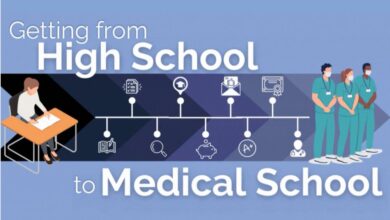My decision to pursue nursing before becoming a doctor was logical: my mother had been a nurse, I would enter right out of high school, I would get hands-on skills that most physicians don’t see until well into their third year of medical school, and heck, a nice paycheck doesn’t hurt either. But the fact still remains: the process would be the most grueling and intense experience of my life.
Like a jigsaw puzzle, the pieces of reason were there, and taking a step back, one might reflect and appreciate the whole picture. Yet, the costs of pursuing my goals in this way were sizable: going to nursing school meant that I risked sacrificing attendance at many well known institutions steeped in their own rich traditions. As an African American male, it also meant that I would be heavily underrepresented and thereby open to feelings of doubt about whether I truly wanted to continue on the path I’d chosen.
||Read: Non-Traditional Student Personal Statement||
At age 17, I knew little about the field of healthcare. I had little understanding of medical instruments like urethral catheters or intravenous fluids. No real understanding of compassion in the face of exhaustion, or providing care that—to most—might seem futile. I was filled only with an understanding that it was a field saturated with brothers, sisters, grandparents and grandchildren who needed a helping hand. I knew I wanted to make an impact on individuals in a very direct way. But here in the United States, one cannot simply enter medical school directly out of high school. So I did research and found that nursing would allow me the opportunity of tending to these immediate needs in society.
But of course, the process would not be easy. As I later found out, it was to be filled with case reports, bodily secretions, and the intonations of doubt folks had when asking me why I chose to study nursing in the first place. This, I think, was the most insidious of all detractors. I could have still transferred to another major or another school. The undergraduate program I attended had hundreds of competing options. Yet, I am here now writing this sentence as a registered nurse. Because when I placed any losses against the gains of learning the skills needed to be an effective agent in the field, the gains won out. There was something to be appreciated in the fact that my suffering could translate into my patients’ gain.
||Read: Story of a Non-Science Premed||
A daily help was the example of my own mother. I think my initial decision to go into nursing was based in part on a desire to connect with her experience. I could call her to discuss my thoughts about a subject, like how to explain the five rights of medication administration to an instructor. She became somewhat of a mentor to me. Being supportive of my decision to enter medicine, my mom/mentor also encouraged me in that endeavor. It was extremely important for me to have such a positive voice around. As with most fields, all my mentors helped me dust my shoulders off, not letting the scratches, slights, or passive aggressiveness get to me, and imparted their wisdom whenever possible. I don’t know where I’d be without support systems like this.
As they say, hindsight is 20/20. I get that. The real question might be: “given all I know now, would I recommend becoming a nurse as a stepping stone to becoming a physician?” My answer: it depends. If a student has the ability to focus intently on one thing, without any distraction of future plans, then yes. But if you are like me, and need frequent encouragement to avoid indulgence in competing interests when things get tough, then perhaps pursuing a straight career path would be the better option. In nursing, you can be a true advocate for your patients every shift, worrying less about the selection of necessary orders as much as the execution. One can form great bonds with coworkers, and have a competitive salary. If a student has been set on medicine, these good things might be viewed as entrapments to progression.
||Read: Premed Myths Part 3||
In the end, as with everything, the choice is ultimately your own. In my case, I’ve learned some new things and met some interesting people, and I’ll have a sense of the gravity that comes with taking on this new role. In transitioning, I will be in the lives of my patients over the long haul, something I think is possible with medicine only. But I know that whether I am a doctor, a nurse aide, or a registered nurse, I am fueled by the core understanding that my passions lie with my patients. So my highest priority as a healer will be to let this love guide me.
Diboro Kanabolo is a medical student at Pritzker School of Medicine, University of Chicago. He worked 2 years as a nurse prior to going to medical school.



